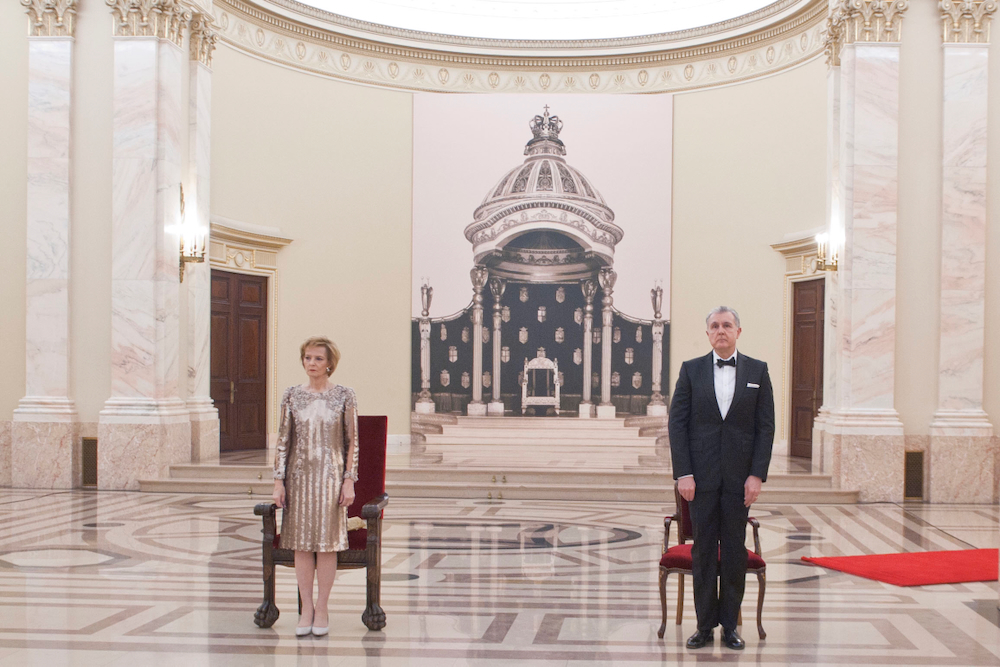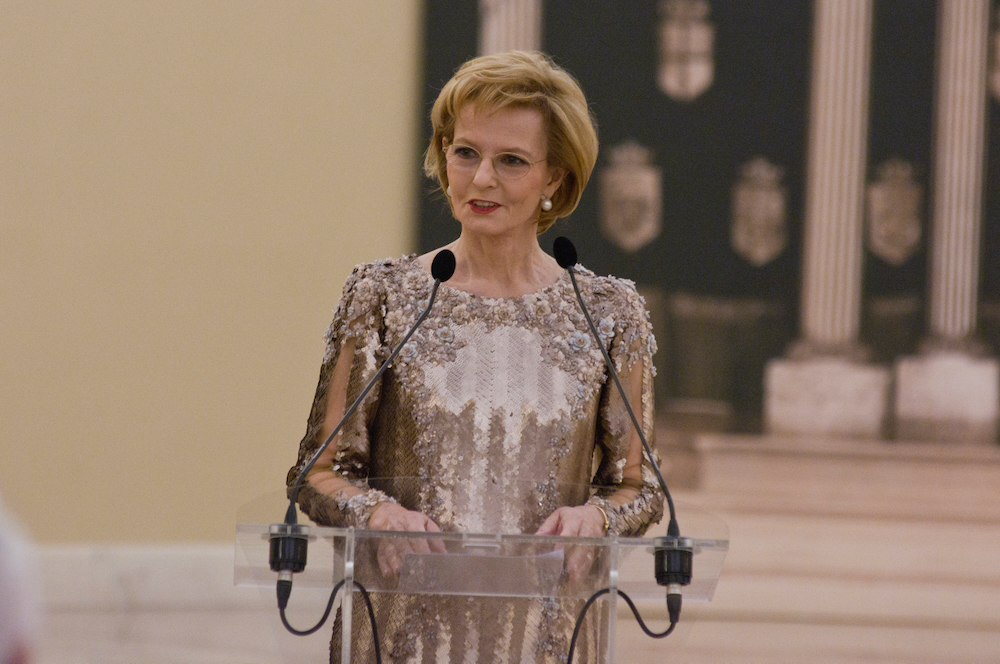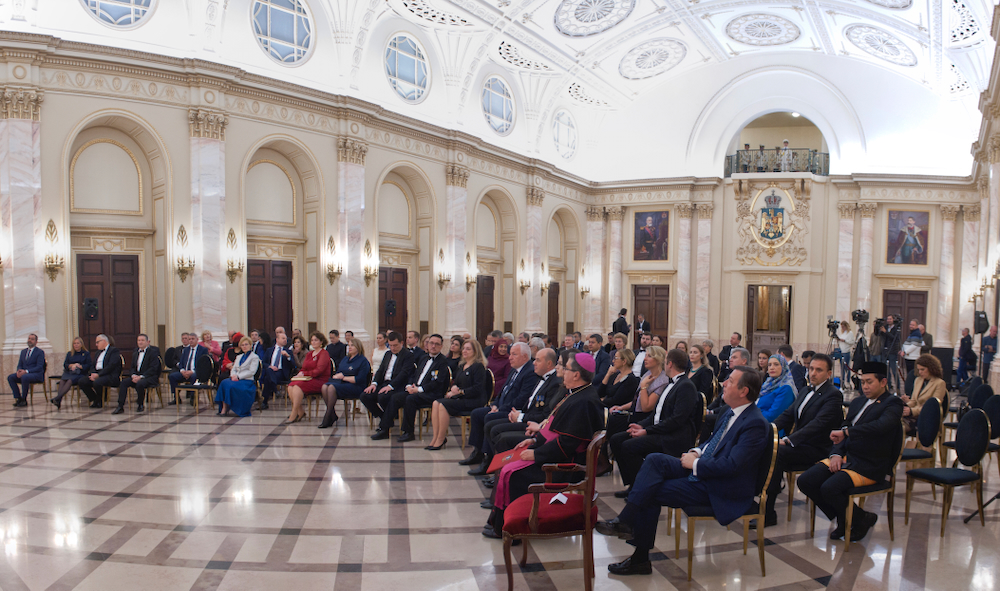The 2022 Royal Evening for the Diplomatic Corps
|
Speech of Her Majesty Margareta Custodian of the Romanian Crown at the Annual Evening for the Diplomatic Corps, Throne Hall, Royal Palace in Bucharest, Tuesday, 6 December 2022 Royal Musings Dean of the Diplomatic Corps, Your Excellencies, Ladies and Gentlemen, I am grateful to you for attending this evening’s gathering, which continues the tradition of the yearly reception of the Diplomatic Corps in our capital city going back to the days of Carol I in the 19th century. This was one of the first traditions my father revived after the fall of the communist dictatorship. I would also like to reiterate my admiration to all of you for your dedication to promoting and consolidating the relations between Romania and the countries you represent. And, in a year during which my husband and I undertook a significant number of foreign visits and missions, I would especially like to mention our visit to the Holy See and our audience with Pope Francis last month. This was an occasion to confirm once again our dedication to protecting all faiths in our country. I would like to extend my thanks to the Apostolic Nuncio, the Dean of our Diplomatic Corps, for his commitment to the success of the visit. Your Excellencies, I know that some of you representing nations outside the European continent are preoccupied with many challenges, such as tackling the economic consequences of the pandemic or combatting the effects of climate crisis and soaring food and energy prices. I do not wish to give the impression that these challenges are in any way less significant than those in Europe. Nevertheless, I hope you will understand if I concentrate this evening on the war, and the catastrophic humanitarian situation on our doorstep. You hardly need a reminder from me about the exceptional gravity of our current security situation. For all the optimistic assumptions we made are now called into question. Far from being eliminated, war has returned to Europe. Yet again, we are facing mass murder. Yet again, a ruler denies the principle of other nations’ equal rights, and even questions whether certain states should continue to exist. And yet again, some are attempting to recreate empires and spheres of influence. This is known to you. So, I would like to highlight certain aspects of the Ukraine crisis that deserve greater attention this evening. First, is the fact that the community of Western and like-minded nations, which extends well beyond Europe, has risen magnificently to the challenge and has proven its resilience. Ukraine has succeeded in defending her independence because her courageous soldiers and citizens received support from many other nations worldwide. Millions of Ukrainian refugees were offered temporary homes throughout Europe without the requirements of immigration controls or other formalities. Romanians and other Europeans bordering Ukraine can now go about their daily lives freely because of the protection offered by the North Atlantic Alliance. One of the most powerful messages the Alliance ever adopted is the slogan “We Are NATO”. Indeed, we ALL are NATO, for the Alliance safeguards our independence and peaceful existence. And where would we be without the European Union? It is the institution coordinating efforts to keep the war-torn Ukrainian economy afloat and the only body capable of managing the vast task of Ukraine’s economic reconstruction when this war is over. Those who started this war believed that we were divided. We have proven them to be wrong, and that is a momentous achievement. My second observation is that, as we stand up to aggression, the key institutions safeguarding our security and prosperity are also changing. Although most of the countries that used to be behind the Iron Curtain have been members of the EU and NATO for almost two decades, for largely historical reasons, the centres of gravity of both institutions, their decision-making and preoccupations remained concentrated on the Western part of the continent. The Ukraine war has now irrevocably shifted attention towards central and eastern Europe, partly because this is where the needs are greatest, and our continent’s future will be decided. This gravity shift is of historic proportions and significance, and one which we should welcome, because it is an absolutely necessary adjustment, for both NATO and the European Union, an accommodation ensuring that these institutions represent a truly united continent. For Romania and other key regional players, such as Poland, this transformation means that our voices will be better heard, but it also entails greater responsibilities in shaping and upholding a European consensus and contributing even more to continental security and stability. I am proud of the role played by Romania in this process, including the recent hosting of the NATO ministerial meeting in Bucharest. And I am sure that you will see the central and eastern Europeans expecting and exercising a much stronger voice when the debate about Ukraine’s reconstruction begins in earnest. Ladies and Gentlemen, My last point concerns the serious commitment we must all make to our eastern neighbourhood. I salute the decision to grant EU membership candidate status to Ukraine and the Republic of Moldova. I know that this was not easy, that membership will not come soon, and that much, very much, is expected from these two nations. Still, the acceptance of the principle that one day, these two countries will join the EU is vital, not only for their security, but also for ours. Our eastern borders will not be peaceful unless these two nations are allowed to live in peace. And, as we have all discovered from our own experience, these nations will not find peace unless they are part of our family; it’s as simple as that. We, in Romania, take a particular interest in the Republic of Moldova, not only due to obvious historical and human connections but also because Moldova’s considerable vulnerabilities can easily be exploited to undermine both Ukraine and Romania, in the future. Recently, my husband and I visited the Republic of Moldova, and I can tell you without any reservation that the leaders in Chisinau are genuinely committed to European integration. However, they are battling daily against destabilisation efforts and sheer poverty. We can be sure that, even if the Ukraine war ends soon, attempts to destabilise Moldova will, paradoxically, only increase. Ensuring that the Republic of Moldova remains firmly committed to her European integration policy is an inseparable part of ensuring that Ukraine prevails in its defences; the two are sides of the same coin. Just as King Michael embarked decades ago on a campaign to persuade our partners that Romania’s natural place was in NATO and the EU, I am pledging myself today to do whatever is in my power to ensure that the Republic of Moldova succeeds in following the same integration path. I will also promote broader efforts to enhance Black Sea regional security by encouraging Georgia’s integration efforts in the coming year. Dean of the Diplomatic Corps, Your Excellencies, I wish to repeat my personal appreciation to you all for your friendship and solidarity. I do believe that our continent will emerge from this war united and perhaps even strengthened in its determination to rebuff those who still think in terms of empires, client-states, and spheres of influence. And I am convinced that we will take even greater comfort from our unity of purpose when we meet again a year from now. I wish you all the very best for the New Year!    |





Pentru a putea trimite un comentariu, trebuie sa bifați "Am citit și sunt de acord cu Politica de confidențialitate"